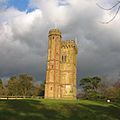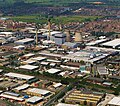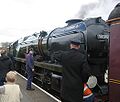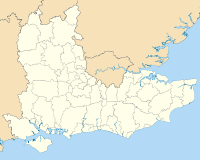The South East England Portal

South East England is one of the nine official regions of England in the United Kingdom at the first level of ITL for statistical purposes. It consists of the counties of Buckinghamshire, East Sussex, Hampshire, the Isle of Wight, Kent, Oxfordshire, Berkshire, Surrey and West Sussex. Major towns and cities in the region include Brighton and Hove, Canterbury, Milton Keynes, Southampton, Portsmouth, Slough, Reading and Oxford.
South East England is the third-largest region of England, with a land area of 19,072 square kilometres (7,364 sq mi), and is also the most populous with a total population of over nine million. The region contains eight legally chartered cities: Brighton and Hove, Canterbury, Chichester, Milton Keynes, Oxford, Portsmouth, Southampton and Winchester. The region's close proximity to London has led to South East England becoming a prosperous economic hub with the largest economy of any region in the UK, after London. The region is home to Gatwick Airport, the UK's second-busiest airport, and Heathrow Airport (the UK's busiest airport) is located adjacent to the region's boundary with Greater London. The coastline along the English Channel provides numerous ferry crossings to mainland Europe.
The region is known for its countryside, which includes two national parks: the New Forest and the South Downs, as well as the North Downs, the Chiltern Hills and part of the Cotswolds. The River Thames flows through the region and its basin is known as the Thames Valley. It is also the location of a number of internationally known places of interest, such as HMS Victory in Portsmouth, Cliveden in Buckinghamshire, Thorpe Park and RHS Wisley in Surrey, Blenheim Palace in Oxfordshire, Windsor Castle in Berkshire, Leeds Castle, the White Cliffs of Dover and Canterbury Cathedral in Kent, Brighton Palace Pier, and Hammerwood Park in East Sussex, and Wakehurst Place in West Sussex. The region has many universities; the University of Oxford is the oldest in the English-speaking world, and ranked among the best in the world.
South East England is host to various sporting events, including the annual Henley Royal Regatta, Royal Ascot and The Derby, and sporting venues include Wentworth Golf Club and Brands Hatch. Some of the events of the 2012 Summer Olympics were held in the south east, including the rowing at Eton Dorney and part of the cycling road race in the Surrey Hills.
In medieval times, South East England included much of the Kingdom of Wessex, which was the precursor to the modern state of England. Winchester was the capital of England after unification of the various states, including the kingdoms of Kent, Sussex and Mercia. Winchester stopped being the administrative capital of England some time in the 13th century as its influence waned while the City of London dominated commerce. The last monarch to be crowned at Winchester was Richard II in 1377, although the last monarch to be crowned by the Bishop of Winchester was Queen Mary I in 1553. (Full article...)
Selected article
Wakehurst, previously known as Wakehurst Place, is a house and botanic gardens in West Sussex, England, owned by the National Trust but used and managed by the Royal Botanic Gardens, Kew (RBG Kew). It is near Ardingly, West Sussex in the High Weald (grid reference TQ340315), and comprises a late 16th-century mansion, a mainly 20th-century garden and, in a modern building, Kew's Millennium Seed Bank. Visitors are able to see the gardens, the mansion, and also visit the seed bank. The garden today covers some 2 km2 (490 acres) and includes walled and water gardens, woodland and wetland conservation areas.
RBG Kew has leased the land from the National Trust since 1965 and much has been achieved in this time, from the Millennium Seed Bank project and the creation of the Loder Valley and Francis Rose Nature Reserves to the introduction of the visitor centre, the Seed café and Stables restaurant, along with the development of the gardens.
Wakehurst is listed Grade I on the National Heritage List for England, and its gardens are listed Grade II* on the Register of Historic Parks and Gardens.
The stables are listed Grade II* and the South Lodge and gateway is listed Grade II. (Full article...)
Selected pictures
Selected biography

Charles Algernon Fryatt (2 December 1872 – 27 July 1916) was a British merchant seaman who was court martialled by the Imperial German Navy for attempting to ram a German U-boat in 1915. When his ship, the SS Brussels, was captured by the Germans off occupied Belgium in 1916, Captain Fryatt was court-martialled by German military law and sentenced to death for "illegal civilian warfare". He was executed by firing squad near Bruges, Belgium. In 1919, his body was reburied with honours in the United Kingdom. (Full article...)
On This Day in South East England
17 June:
- 1648: The Battle of Maidstone took place in Kent.
- 1718: George Howard, English field marshal and politician who became Governor of Minorca, was born in Great Bookham, Surrey
- 1778: English-Australian explorer Gregory Blaxland was born at Fordwich, Kent.
- 1907: Brooklands motor racing circuit near Weybridge was opened.
- 1919: between 300 and 800 Canadian soldiers rioted and attacked the police station in Epsom, Surrey in an event now known as the Epsom Riot.
- 1983: Singer Lee Ryan, formerly of Blue, was born in Chatham.
Categories
Related portals
WikiProjects
Topics
Associated Wikimedia
The following Wikimedia Foundation sister projects provide more on this subject:
-
 Commons
Commons
Free media repository -
 Wikibooks
Wikibooks
Free textbooks and manuals -
 Wikidata
Wikidata
Free knowledge base -
 Wikinews
Wikinews
Free-content news -
 Wikiquote
Wikiquote
Collection of quotations -
 Wikisource
Wikisource
Free-content library -
 Wikiversity
Wikiversity
Free learning tools -
 Wikivoyage
Wikivoyage
Free travel guide -
 Wiktionary
Wiktionary
Dictionary and thesaurus
-

-

-

-

-
Random portal
Purge server cache








































































![Image 76 Credit: Michael Wilmore The Kent & East Sussex Railway was opened by Colonel H.F. Stephens, the railway engineer, in 1900. At its fullest extent, it ran nearly 22 miles[35km] from Robertsbridge on the Tonbridge to Hastings main line to Headcorn on the main line between Tonbridge and Ashford, Kent. More about the Kent & East Sussex Railway... (from Portal:Kent/Selected pictures)](https://upload.wikimedia.org/wikipedia/commons/thumb/2/2f/KentAndEastSussexRailway%28MichaelWilmore%29Oct2005.jpg/120px-KentAndEastSussexRailway%28MichaelWilmore%29Oct2005.jpg)












































Recent Comments